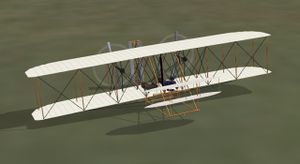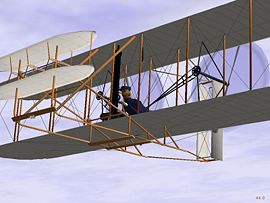Wright Flyer: Difference between revisions
m (Bot: Automated text replacement (-</tt>\r\n}} +\n}})) |
m (Bot: Automated text replacement (-|fgname = <tt> +|fgname = )) |
||
| Line 6: | Line 6: | ||
|status = | |status = | ||
|authors = Jim Wilson (3D), Michael Selig, PhD (FDM) | |authors = Jim Wilson (3D), Michael Selig, PhD (FDM) | ||
|fgname = | |fgname = wrightFlyer1903 | ||
}} | }} | ||
The '''Wright Flyer''' (often retrospectively referred to as '''Flyer I''' and occasionally '''Kitty Hawk''') was the first powered [[aircraft]] designed and built by the Wright brothers. The flight is recognized by the Fédération Aéronautique Internationale, the standard setting and record-keeping body for aeronautics and astronautics, as "the first sustained and controlled heavier-than-air powered flight". | The '''Wright Flyer''' (often retrospectively referred to as '''Flyer I''' and occasionally '''Kitty Hawk''') was the first powered [[aircraft]] designed and built by the Wright brothers. The flight is recognized by the Fédération Aéronautique Internationale, the standard setting and record-keeping body for aeronautics and astronautics, as "the first sustained and controlled heavier-than-air powered flight". | ||
Revision as of 19:12, 30 November 2010
 | |
| Type | Historical aircraft |
|---|---|
| Author(s) | Jim Wilson (3D), Michael Selig, PhD (FDM) |
| FDM | UIUC |
| --aircraft= | wrightFlyer1903 |
| Status | Unknown |
The Wright Flyer (often retrospectively referred to as Flyer I and occasionally Kitty Hawk) was the first powered aircraft designed and built by the Wright brothers. The flight is recognized by the Fédération Aéronautique Internationale, the standard setting and record-keeping body for aeronautics and astronautics, as "the first sustained and controlled heavier-than-air powered flight".
The real Wright Flyer survived and is currently at the National Air and Space Museum, with a number of replicas also existing, such as at the Aviodrome in The Netherlands.
The flight dynamics model was developed by Michael Selig at the University of Illinois, Urbana Champaign. The visual model started life as an MSFS aircraft, but was substantially reworked, enhanced, and animated by Jim Wilson of the FlightGear project. The Wright Flyer for FG uses the UIUC Flight Dynamics Model.
Development status/Issues/Todo
General:
- propeller is not moving/turning when engine is running at low power
- engines can't be turned off
